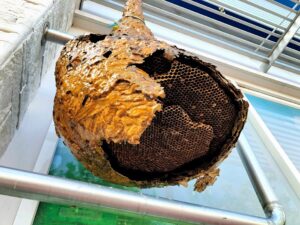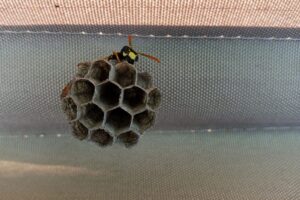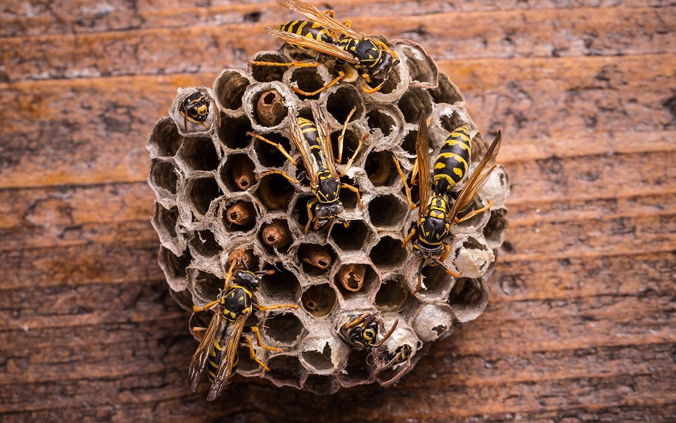Homeowners should be aware of the various stinging insects that can potentially establish nests on their properties. The two most common culprits are wasps and hornets. Both of them can be intimidating and pose risks to humans and pets.
As we have seen on numerous occasions, many homeowners are confused about the differences between wasp nests and hornet nests. So in this post, you will learn the main differences between the two, including their structures, but also the quantity and behavior of occupying insects.
Recognizing Wasp Nests vs. Hornet Nests:
Wasp nests typically have a papery appearance and are constructed from chewed wood fibers mixed with saliva. They often resemble an upside-down umbrella or a ball and consist of multiple tiers or cells. In general, wasp nests are smaller in size and they range from a few inches to a foot in diameter. Wasp nests are usually attached to protected areas, such as eaves, porch ceilings, or shrubs.
Hornet nests, on the other hand, are typically larger and more intricate than wasp nests. They are built from the same papery material, however, the material is thicker than a wasp nest. When it comes to hornet nests, these can grow significantly larger than wasp nests, often reaching several feet in diameter. They have a unique teardrop or a football shape.
Hornet nests are usually found hanging from the branches of trees and bushes. You may also see them in the eaves of buildings and within voids in structures, and in attics, barns, or other secluded places.

Types Of Wasp And Hornet Nests:
Wasp Nests:
- Paper wasps construct open, exposed nests usually attached to buildings or plants.
- Yellowjackets build concealed nests underground, within wall voids, or in crawl spaces.
- Mud daubers form nests using mud or clay, typically found in protected areas like porches or sheds.
Hornet Nests:
- Bald-faced hornets create large, enclosed nests high above ground, often in trees or shrubs.
- European hornets establish nests in cavities, such as tree hollows, wall voids, or attics.
Occupancy Of Wasp And Hornet Nests:
Wasp nests can house varying numbers of occupants depending on the species. A few dozen to several hundred wasps usually occupy the nest. Some wasp species, like the paper wasp, build small nests with only a few occupants. Other species, like the yellow jacket, can build much larger nests with hundreds of occupants. Pay attention to the number of cells within the nest as these can give an indication of the population size.
It has been observed that hornet nests have typically larger populations than wasp nests. However, the number of hornets can range from only a few occupants to a few hundred or even a few thousand hornets living inside, with mature nests harboring the highest numbers.
These nests are always hierarchical, with a queen, workers, and males (drones).
Wasp And Hornet Behavior Towards Humans And Pets:
Wasps are generally defensive and may sting if they feel threatened. They can be aggressive near their nests and exhibit territorial behavior. Common wasp species like yellowjackets are known to scavenge food from outdoor events, increasing the chances of encounters with humans and pets.
Hornets are less likely to sting unless their nest is disturbed or they perceive a threat. However, if a hornet feels threatened, it can deliver a more painful sting compared to most wasps. While both wasps and hornets can be aggressive towards humans and pets, hornets can exhibit more aggressive behavior if they feel that their colony is threatened. They will also attack in larger numbers.

Seasonal Patterns Of Nest Construction:
Knowing seasonal patterns is important in order to understand when you are likely to encounter a nest built by either wasps or hornets. When it comes to the time of year that wasps and hornets construct their nests, it usually depends on the species. But typically, wasps establish their nests in the spring. The exact timing can vary depending on the region and climate, though. Nests tend to grow throughout the summer, and by fall, new reproductive wasps are produced, which ensures the survival of the species during winter.
Hornets follow a similar seasonal pattern to wasps, and they also initiate nest construction in the spring. However, some species, like the bald-faced hornet, start building their nests in the fall. By late summer or early fall, the nests reach their peak size and hornets prepare for mating and overwintering.
On a final note, if you’re concerned about these stinging insects on your property, you need to first understand the difference between wasp nests and hornet nests. Learn to recognize their structures as well as their occupants and their behavior. This way you can make an informed decision regarding nest removal.
However, you must be aware that when dealing with wasp or hornet nests, it is crucial to prioritize safety. Attempting DIY removal can be dangerous and lead to stings or further aggravation of the insects.
For this reason, you should always seek professional help. Reach out to a local pest control expert who has the knowledge, skills, and necessary protective equipment to safely remove wasp or hornet nests, ensuring the well-being of you, your family, and your pets.
Contact our team at Peachtree Pest Control in Atlanta to inquire about our safe and effective wasp or hornet nest removal services. Stay proactive, stay safe!
